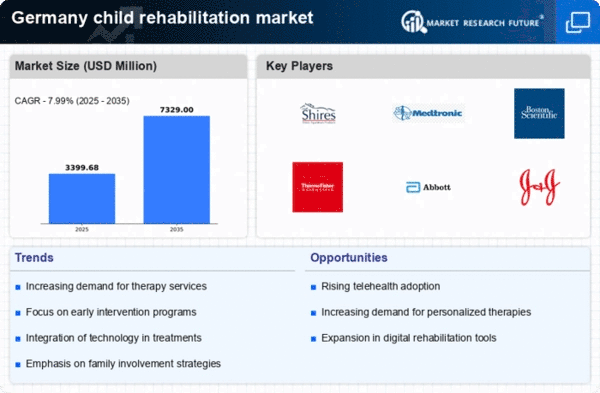Advancements in Rehabilitation Techniques
Advancements in rehabilitation techniques are transforming the landscape of the child rehabilitation market in Germany. Innovative approaches, such as neurofeedback and play therapy, are gaining traction among practitioners, leading to improved outcomes for children with various conditions. Research indicates that these modern techniques can enhance cognitive and emotional development, making them appealing to parents seeking effective solutions. The integration of evidence-based practices into rehabilitation programs is becoming increasingly common, as practitioners strive to provide the best possible care. This trend not only enhances the effectiveness of rehabilitation services but also attracts more families to seek assistance, thereby contributing to the growth of the child rehabilitation market.
Government Funding and Support Initiatives
Government funding and support initiatives play a crucial role in shaping the child rehabilitation market in Germany. The German government has allocated substantial resources to enhance healthcare services for children, particularly those requiring rehabilitation. In recent years, funding for child rehabilitation programs has increased by approximately 15%, reflecting a commitment to improving access to necessary services. This financial backing enables healthcare providers to develop innovative rehabilitation programs and expand their reach. Furthermore, public awareness campaigns funded by the government aim to educate families about available resources, thereby driving demand for rehabilitation services. As a result, the child rehabilitation market is likely to benefit from ongoing government support and investment.
Rising Awareness of Developmental Disorders
The increasing awareness of developmental disorders among parents and educators in Germany appears to be a significant driver for the child rehabilitation market. As more families recognize the signs of conditions such as autism spectrum disorder and attention deficit hyperactivity disorder, the demand for specialized rehabilitation services is likely to rise. Reports indicate that approximately 5% of children in Germany are diagnosed with some form of developmental disorder, which necessitates tailored rehabilitation programs. This heightened awareness encourages early diagnosis and intervention, thereby fostering a proactive approach to child development. Consequently, the child rehabilitation market is expected to expand as more families seek professional support and resources to address these challenges.
Increased Collaboration Among Healthcare Providers
Increased collaboration among healthcare providers is emerging as a vital driver for the child rehabilitation market in Germany. Multidisciplinary teams, including pediatricians, psychologists, and occupational therapists, are working together to create comprehensive rehabilitation plans tailored to individual needs. This collaborative approach ensures that children receive holistic care, addressing both physical and emotional aspects of their development. Studies suggest that integrated care models can lead to better outcomes, as they facilitate communication and coordination among providers. As more healthcare professionals recognize the benefits of collaboration, the child rehabilitation market is likely to see a rise in demand for services that offer coordinated care.
Growing Demand for Personalized Rehabilitation Programs
The growing demand for personalized rehabilitation programs is significantly influencing the child rehabilitation market in Germany. Parents increasingly seek tailored solutions that cater to the unique needs of their children, recognizing that a one-size-fits-all approach may not be effective. This trend is supported by research indicating that individualized rehabilitation plans can lead to better engagement and outcomes for children. As a result, rehabilitation providers are adapting their services to offer customized programs that consider each child's specific challenges and strengths. This shift towards personalization not only enhances the effectiveness of rehabilitation but also fosters a deeper connection between families and service providers, thereby driving growth in the child rehabilitation market.

















